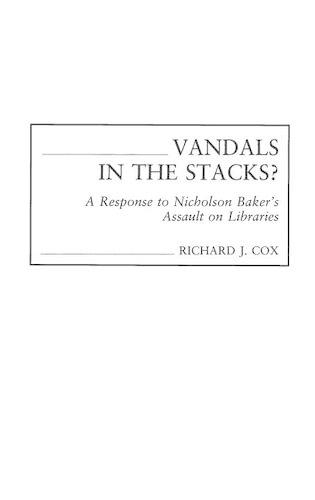
Vandals in the Stacks: A Response to Nicholson Baker's Assault on Libraries
(Hardback)
Publishing Details
Vandals in the Stacks: A Response to Nicholson Baker's Assault on Libraries
By (Author) Richard J. Cox
Bloomsbury Publishing PLC
Praeger Publishers Inc
30th June 2002
United States
Classifications
Tertiary Education
Non Fiction
020
Physical Properties
Hardback
232
Description
A response to the book that generated wide-scale public discussion and controversy about libraries and archives. Libraries and archives have violated their public trust, argues Nicholson Baker in his controversial book Double Fold, by destroying traditional books, newspapers, and other paper-based collections. Baker's powerful and persuasive book is wrong and misleading, and Cox critiques it point by point, questioning his research, his assumptions, and his arguments about why and how newspapers, books, and other collections are selected and maintained. Double Fold, which reads like a history of libraries and archives, is not a history at all, but a journalistic account that is often based on fanciful and far-flung assertions and weak data. The present book provides an opportunity to understand how libraries and archives view their societal mandate, the nature of their preservation and documentary functions, and the complex choices and decisions that librarians and archivists face. Libraries and archives are not simple warehouses for the storage of objects to be occasionally called upon by a scholar, but they play vital roles in determining and shaping a society's knowledge and documentation.
Reviews
.,."a must-read for all librarians."-American Libraries
[o]ffers the reader a reasoned and balanced account of the issues raised by Baker. Assuming the general public is interested in a reasoned account, Cox will be successful in his objective of bringing to the wider public audience his concerns about the future of the archival record. Regardless of the public interest, however, he has given professionals concerned with the issues of the preservation of society's record a solid base from which to continue the discussions.-portal: Libraries and the Academy
Reading "Vandals" will help you to decide where you stand on a range of preservations issues, and help you determine whether or not to jetisson that bulky card catalog. Very Good.-The Shy Librarian
The Society of American Archivists requested an answer to Baker's book, and that grew into this book. Unlike Baker's work, which was aimed at the general public, Cox's response is aimed at professional librarians and archivists. This is a valuable book for anyone who is queried about Baker's attacks. Baker has sounded an alarm, inspiring significant concern. Here are the foundations for a calm, reasoned, professional response.-Booklist/Professional Reading
...a must-read for all librarians.-American Libraries
...a must-read for all librarians.American Libraries
"offers the reader a reasoned and balanced account of the issues raised by Baker. Assuming the general public is interested in a reasoned account, Cox will be successful in his objective of bringing to the wider public audience his concerns about the future of the archival record. Regardless of the public interest, however, he has given professionals concerned with the issues of the preservation of society's record a solid base from which to continue the discussions."-portal: Libraries and the Academy
..."a must-read for all librarians."-American Libraries
"Reading "Vandals" will help you to decide where you stand on a range of preservations issues, and help you determine whether or not to jetisson that bulky card catalog. Very Good."-The Shy Librarian
"The Society of American Archivists requested an answer to Baker's book, and that grew into this book. Unlike Baker's work, which was aimed at the general public, Cox's response is aimed at professional librarians and archivists. This is a valuable book for anyone who is queried about Baker's attacks. Baker has sounded an alarm, inspiring significant concern. Here are the foundations for a calm, reasoned, professional response."-Booklist/Professional Reading
"[o]ffers the reader a reasoned and balanced account of the issues raised by Baker. Assuming the general public is interested in a reasoned account, Cox will be successful in his objective of bringing to the wider public audience his concerns about the future of the archival record. Regardless of the public interest, however, he has given professionals concerned with the issues of the preservation of society's record a solid base from which to continue the discussions."-portal: Libraries and the Academy
Author Bio
RICHARD COX is Professor, School of Information Sciences, University of Pittsburgh.
